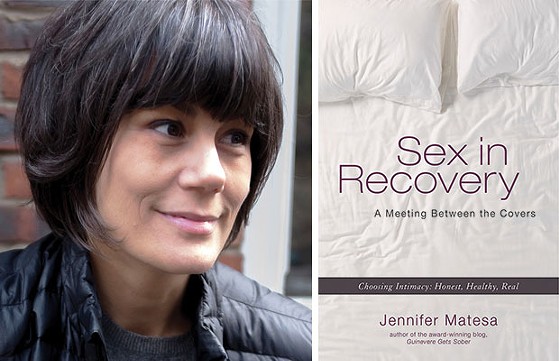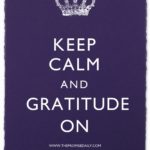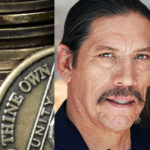Posted by Susan on February 1, 2017
By Nick Keppler at Pittsburgh City Paper
“I talked to a number of people in their late 20s and early 30s who had never had sex sober.”
Jennifer Matesa has had a lot of Skype conversations about sex, some of them lasting more than three hours. The Friendship-based author recently released Sex in Recovery: A Meeting Between the Covers (Hazelden Publishing). The 220-page nonfiction book ($15.95) includes oral histories from former substance-abusers about the impact of addiction and recovery on their sex lives, between Matesa’s own essays. It’s her second book on a related topic, after the fitness-focused The Recovering Body. She documents her own story about overcoming addiction to prescription painkillers on her blog guineveregetssober.com.
 How did you find people to talk to for this book?
How did you find people to talk to for this book?
I’ve had a blog for six-and-a-half years, so when you have a blog that gets any amount of attention, you meet people on the blog, who’ve commented, and that’s part of my network. [Another] part of my network is recovering people in the city of Pittsburgh. I just put the word out that I was doing this book, and they would lead me to people.
What was the most surprising thing someone told you?
Maria Luz, the trans woman, talked about how she had worked Santa Monica Boulevard [in Los Angeles], which is a notorious tricking place, and how she had been mentored by a drag queen to get into the cars and do what the guys wanted. In order to do that, she had to get drunk, and in order to live with herself after, she had to get wasted. Later in recovery, when she quit drinking and using, she realized what she had done in those cars — if you consider the body a temple — was sell off all the sacred stuff in the temple to get money, and her addiction had been critical to that.
How does addiction impact someone’s relationship to sex?
I talked to a number of people in their late 20s and early 30s who had never had sex sober. Then when I started talking about the book, I heard stories from [non-recovering] people about never having sober sex, about needing to take a drink to take their clothes off with somebody or to even touch somebody because we are so touch-averse. … People start developing their sexual identity in their teenage years, and that’s when people start drinking and using. … If you get to your 20s and you get sober and you’ve never had sex sober, it’s very, very hard to imagine how to touch another person or even know what you want sexually if you don’t have that substance to manipulate you.
It sounds unbearable, especially considering all the usual self-scrutiny that comes with sex.
It’s scary, and some people go one way and have sex with a lot of people. And I’ve talked to people who were celibate for eight years. I was having lunch and one person told me, “I haven’t had sex in 12 years. What should I do?” What could I tell her? I can’t solve that problem for her. This society is so full of tips, like “Ten Tips to Solve This Problem,” but this is a problem of identity. It’s a problem of fear of being touched and of touching someone.
You criticize the no-sex-for-a-year rule common to recovery programs. What’s wrong with it?
People are just told “don’t have sex for a year” and then aren’t told anything else. I think a better approach is to tell a person, “It might be good for you to not have sex for a while and notice what comes up for you.” We’re taught in abstinent 12-step recovery to take inventory of resentments and fears and stuff like that, and they’re told to write a sex inventory. That might be a good thing to make as a part of the sex inventory: [an understanding of] what comes up for you when you’re not having sex and how to establish a sexual relationship with yourself first. But this isn’t taught. The books don’t give any advice on this. They have really good passages about sex and why it’s important to change your behavior around sex, but there’s no opening for discussion. I think it’s important for people to think for themselves. And another reason: Everybody knows that no one follows that rule anyway.
Read more here.
Recent Posts
- 5 REASONS WHY HAVING A SPONSOR IS ESSENTIAL
- How To Overcome The “I’m No Fun Without Alcohol” Myth
- HOW TO MEDITATE. 6 TIPS FOR BEGINNERS.
- Believe Change is Possible
- Choose Your Battles
- Six Tips for a Successful Sober September
- SHE IS ME, TOGETHER ARE WE
- Registered Nurse on DUTY!
- Plant a Seed and Watch it Grow
- Painting the Buddha
- Listen to the VOICE of an Addict
- Fall Seven Times, Stand up Eight.
- Facing Your Feelings
- Coming out of the Fire, Polished.
- Benefits Associated with Women-Only Support Groups
Resources
- Allison McCabe | The Fix The Fix
- Dr Lauren Costine Dr Lauren Costine
- DRUNKY DRUNK GIRL I’m a woman who loves (or, loved) wine and writes about getting sober.
- Intervention Allies Carmine Thompson, certified interventionist.
- KLEAN Treatment Centers Aaddiction treatment team which specializes in all aspects of chemical dependency addiction as well as co-occurring disorders.
- Mrs D is Going Without Mrs D used to be a boozy housewife. Now she’s not.
- MusiCares – Santa Monica, CA provides a safety net of critical assistance for music people in times of need.
- Sober Senorita My name is Kelly Fitzgerald and I am a person in long-term recovery from a substance use disorder.
- SoberRecovery SoberRecovery : Alcoholism Drug Addiction Help and Information
- Sobriety for Women Online resource for women & families suffering from various forms of addiction. Detox/Treatment/SoberLiving placement.
- The Sober School Sober School is the company I created to help other women
- UnPickled I am learning to walk without the crutch of alcohol…
- Women For Sobriety, Inc. is a non-profit organization dedicated to helping women overcome alcoholism and other addictions. It is, in fact, the first national self-help program for women alcoholics.










